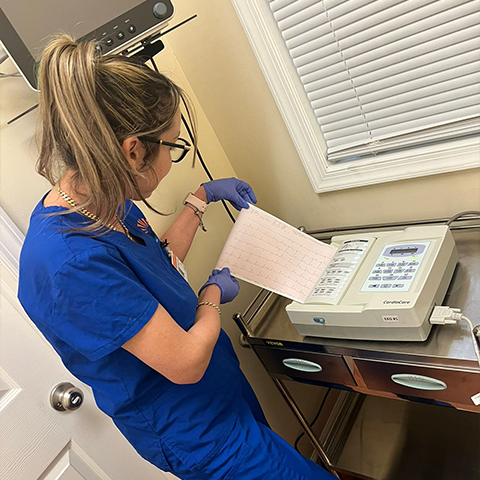
Prepare for a career as an EKG technician. This course will train you to work as an EKG tech and prepare you for the National Healthcareer Association (NHA) nationally recognized Certified EKG Technician (CET) certification exam.
Become a HealthCare Professional!
Request more info
EKG Technician Program
-
Duration: 8-11 Weeks
-
On Campus | Online
-
Hands On Education
ADDRESS
14521 Old Katy Rd, Suite 200, Houston, TX 77079
PROGRAM METHOD
ON CAMPUS | ONLINE
Program Objective
This program prepares students for cardiac monitoring including Holter, 12 Lead EKG, and Stress Testing.
Program Description
The program will cover the key terminology relating to the heart and its basic anatomy and physiology of the Cardiovascular System and an understanding of how an EKG uses electrical conduction to get readings on the function of the heart concepts of cardiac polarization, depolarization, and repolarization.
At the end of the Program, the student will master the functions of a EKG Technician:
Patient Preparation: EKG technicians prepare patients for the procedure, explaining the process and ensuring they are comfortable and relaxed during the test.
Electrode Placement: They apply electrodes to specific areas of the patient’s chest, arms, and legs. These electrodes are connected to the EKG machine to record the heart’s electrical signals.
Operating EKG Equipment: EKG technicians are skilled in operating the EKG machine and ensuring that it functions correctly during the recording process.
Performing EKGs: They conduct electrocardiograms by monitoring the heart’s electrical signals for a specific duration, typically a few seconds or minutes.
Recognizing Abnormalities: While EKG technicians are not responsible for diagnosing conditions, they are trained to identify basic abnormalities in the EKG tracings and notify medical staff if significant issues are observed.
Maintaining Patient Records: They maintain accurate records of the EKG procedures, including patient information, EKG tracings, and any relevant notes or observations.
Calibrating Equipment: EKG technicians ensure that the EKG machine is appropriately calibrated to produce accurate results.
Assisting Medical Staff: They may assist physicians, cardiologists, or other healthcare professionals in performing stress tests or other specialized EKG procedures.
Ensuring Patient Safety: EKG technicians follow safety protocols to ensure patient safety during the procedure and maintain a clean and sterile environment.
Communicating with Patients: They communicate with patients to provide instructions and address any concerns or questions related to the EKG procedure.
Troubleshooting Technical Issues: If there are technical issues with the EKG equipment, technicians may troubleshoot and attempt to resolve them, or report the problems to the appropriate personnel.
After completing the program, students are eligible to sit for the National certifications for EKG Techncian. Certified Cardiographic Technician (CCT) from CCI or Certified EKG Technician (CET) from NHA
